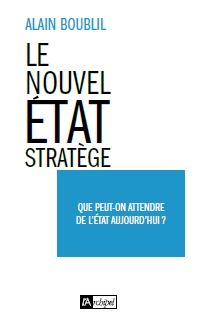Les dernières publications
The aggravation of international tensions should not make us forget the current fragility of the economic and financial balances in which the stability of the dollar and the resulting confidence must play an essential role. In the past, taxes were successively assigned three missions: to finance public spending, then to contribute to the redistribution of income to correct inequalities, and finally, with the application of Keynesian principles, to act on economic activity by stimulating investment and household consumption through the budget deficit.
After decades during which wealth accumulated, even if it was not evenly distributed, and the exchange of goods ...
Continue reading
The importance of issues relating to public deficits and France's debt in the debate is excessive and has the consequence of diverting the attention of both the media and political leaders from the real issues facing the country. Dramatization is a well-known method of pushing through if not accepting unpopular measures. It reaches its climax today when the possibility of the IMF being placed under supervision or even defaults is raised. The fault lies with the French who do not work enough and who take excessive advantage of an overly generous social protection system.
International comparisons are then used ...
Continue reading
At a time when international tensions are rising and the need for a solid and united Europe has never been stronger, one country, Poland, closely affected by the threats resulting from these tensions, elects an openly Eurosceptic far-right president. A period of cohabitation began with the government of Donald Tusk, a convinced European and very committed to finding a solution to the Ukrainian crisis. The case of Poland is not isolated. The next day, the leader of the Dutch far-right party, Geert Wilders, left the coalition, forcing Prime Minister Schoof to resign and call elections. The coming to power of ...
Continue reading
At a time when the debate on public debt in France is becoming increasingly tense, the situation in the United States does not seem to attract much attention. However, the results are not very bright and the threats to the world economy are therefore real. The federal debt in 2024, to which we would have to add the debt of the federated states, if we want to make comparisons, reached 98% of GDP in 2024 and the forecasts for 2035, with no change in policy, 125%. The federal deficit in 2024 amounted to 6.4% of GDP and could reach ...
Continue reading
Le nouvel Etat-stratège
 Le dernier livre d'Alain Boublil, le nouvel Etat-statège (Editions de l'Archipel) est paru le 5 février 2014.
Le dernier livre d'Alain Boublil, le nouvel Etat-statège (Editions de l'Archipel) est paru le 5 février 2014.
Le livre apporte les réponses de son auteur à la question qui est, en France, au centre de tous les débats politiques: "Que peut-on attendre de l'Etat aujourd'hui ? " Et il formule plusieurs suggestions sur l'exercice du pouvoir tirées de son expérience passée auprès de François Mitterrand. Observateur de l'économie mondiale comme conseil des nombreuses grandes entreprises qui ont fait appel à lui, il trace un portrait de la France d'aujourd'hui bien moins pessimiste que ce que l'on entend parfois, à condition que chacun fasse preuve de lucidité sur ses propres comportements.
Les exigences ont certes été exacerbées par la crise. Mais y faire face est de plus en plus difficile car l'écart s'est creusé entre les attentes de chacun et la réduction des marges de manoeuvres publiques du fait des règles internationales, de l'endettement et des contraintes environnementales.
En dix chapitres, Alain Boublil dresse un bilan sans complaisances, prend la mesure des possibilités et des limites de l'Etat et il ouvre des voies nouvelles pour l'action publique. Il évoque le sauvetage de l'euro, le fardeau de la dette et le ras-le-bol fiscal, l'Etat-patron de Colbert à Jean-Marie Messier, le retour du complexe vis-à-vis de l'Allemagne et les nouveaux outils de l'Etat-stratège dans la mondialisation face aux défis industriels, aux enjeux de la transition énergétique, à la "dictature du CO2" et à la révolution du gaz de schiste. Et il met en garde contre les dérives de l'Etat-spectacle, qui gènent l'efficacité de l'action publique et les facilités de l'Etat-guichet qui débouchent sur le clientélisme.
La Publication la plus lue
24/06/2025
French version
The aggravation of international tensions should not make us forget the current fragility of the economic and financial balances in which the stability of the dollar and the resulting confidence must play an essential role. In the past, taxes were successively assigned three missions: to finance public spending, then to contribute to the redistribution of income to correct inequalities, and ...
Continue reading
 Le dernier livre d'Alain Boublil, le nouvel Etat-statège (Editions de l'Archipel) est paru le 5 février 2014.
Le dernier livre d'Alain Boublil, le nouvel Etat-statège (Editions de l'Archipel) est paru le 5 février 2014.